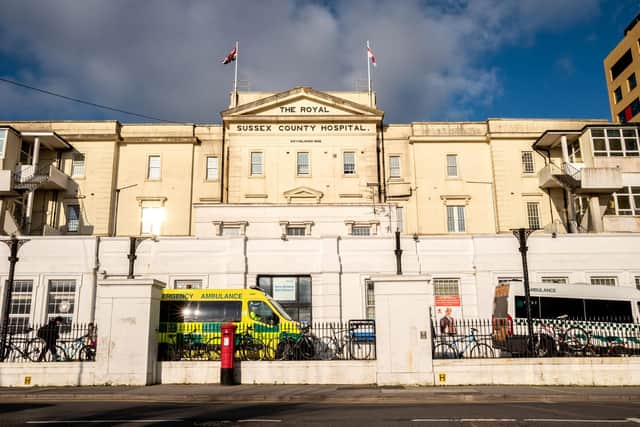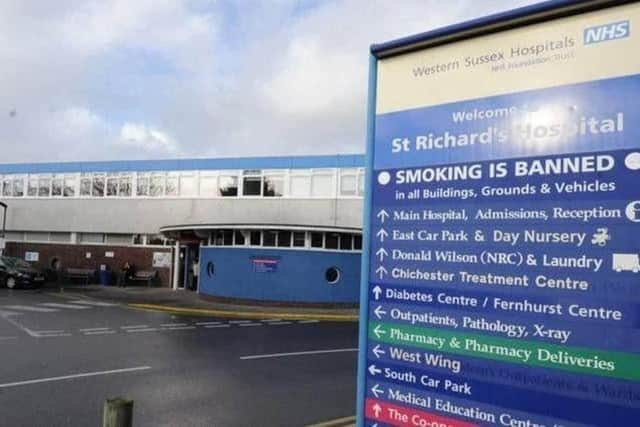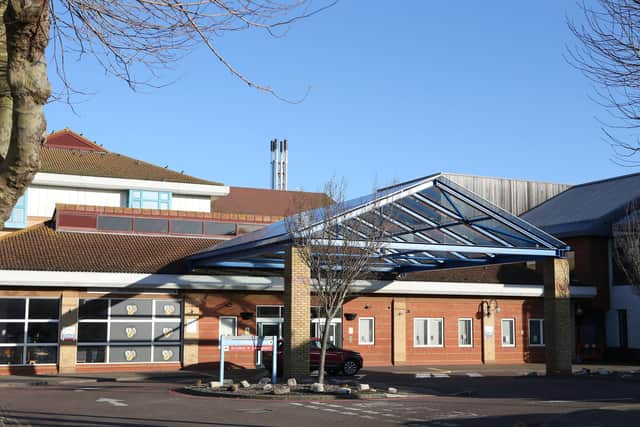Sussex hospital trust leaders 'recognise how much work still lies ahead' after damning inspection report
and live on Freeview channel 276
The Care Quality Commission (CQC) has downgraded the overall rating of University Hospital Sussex NHS Foundation Trust from outstanding to requires improvement. It comes after an inspection between October and December ‘showed a decline in the care’ being delivered to people ‘across several key areas’.
In response, hospital leaders at the trust said: “We understand the challenges, we have made significant progress already, and we know there’s much more to do.”
Advertisement
Hide AdAdvertisement
Hide AdThe CQC report relates to seven inspections at the trust over an 18-month period – the most recent of which was just over seven-months ago, and looked at the ‘well-led’ domain. The trust’s overall rating has been changed from outstanding to requires improvement, while the ‘well-led’ domain was reduced to inadequate.


UHSussex chief executive Dr George Findlay recognised that, ‘like all NHS organisations’, the trust ‘needs to improve’ as it faces ‘challenges around staffing, fast-growing need for hospital services and recovery from the Covid-19 pandemic’.
He also highlighted the ‘significant positive changes’ that have taken place both before and since the latest CQC inspection in October 2022 – ‘including huge investment in better facilities, a new leadership structure, recruitment at all levels and a big effort to encourage a more open culture’.
Dr Findlay said: “When I took up this role just under a year ago, I commissioned an external review to give me a clear picture of where we stood as a newly formed trust – our strengths and our weaknesses. This review, and our improvement plans were shared with the CQC at the time of our well-led inspection.
Advertisement
Hide AdAdvertisement
Hide Ad“Everything the CQC is saying now chimes with what we already knew, and had committed to addressing right from the start.


“I’m extremely proud of the huge strides that colleagues have made, but we all recognise how much work still lies ahead. The seven months since this inspection have seen rapid progress – now we need to push on again.”
The University Hospital Sussex NHS Foundation Trust is responsible for seven hospitals in Sussex; Worthing Hospital; St Richard’s Hospital in Chichester; Princess Royal Hospital in Haywards Heath; Southlands Hospital in Shoreham-by-Sea as well as the Royal Sussex County Hospital, Royal Alexandra Children’s Hospital and Sussex Eye Hospital – all in Brighton and Hove.
The inspection was ‘in part prompted by whistleblowing concerns from staff’, a CQC spokesperson said.
Advertisement
Hide AdAdvertisement
Hide AdDeanna Westwood, CQC’s director of operations in the south, said the inspection was carried out ‘in response to concerns raised with us around culture and leadership’. She said staff and people using services ‘were being let down by senior leaders’, adding: "Staff told us they felt unable to raise concerns without fear of reprisal.”


The trust highlighted a number of improvements made during Dr Findlay’s first year as chief executive. These included:
- A new leadership development programme to support leaders across the trust;
- A new clinical model to give strong leadership to clinical divisions and individual hospital sites;
Advertisement
Hide AdAdvertisement
Hide Ad- Trust-wide focus on making it easier for people to speak up and raise concerns, including stronger support for the Freedom to Speak Up service;


- Results from the anonymous monthly ‘Pulse’ staff survey show more people now feel confident that the trust would act upon concerns that were raised – up from 49 per cent in September 2022 to 58 per cent in March 2023, ‘closing in on the very best-performing trusts nationally’;
- £120m invested across all hospital sites (above and beyond the £500m Louisa Martindale Building and planned £48m redevelopment of A&E in Brighton);
- Weekly, structured sessions with frontline staff involving the whole executive team, and one or more executive team member spending time with frontline teams, every day
Advertisement
Hide AdAdvertisement
Hide AdThe trust said there has also been ‘strong progress in patient care’, including:
- A significant reduction in the number of people facing the longest waits for treatment – ‘now only just over 250 people’;
- Ambulance delays of an hour or more down to 3.2 per cent, from 9 per cent at the end of 2022;
- Waits of more than six weeks for diagnostics down by almost a third since late 2022;
Advertisement
Hide AdAdvertisement
Hide Ad- Strengthening performance for cancer waiting times, both for diagnosis, and treatment.
The CQC team visiting in 2022 also concluded that new strategies would ‘improve quality for patients and staff’; that the ‘majority of leaders’ had the experience, capacity and capability ‘to lead effectively’; most patients praised the care, treatment and support they received; the executive team had an appropriate range of skills, knowledge and experience and the new operating model ‘appeared to provide clear structures and evidenced multi-disciplinary leadership’ across hospital sites and divisions.
Dr Findlay said: “Right from my first day, the focus has been on facing up to our problems and giving our amazing staff the tools and support they need to do their jobs. None of the issues raised in this report are new to us, and that is why we were already addressing them.
“Much has changed since the CQC team was here, and that progress makes me confident for the future – delivering NHS care at the moment is really tough, making improvements is tough, but we have the plans and the people in place to do that."
In neurosurgery, services inspectors found:
Advertisement
Hide AdAdvertisement
Hide Ad- The service did not have enough staff to care for people and keep them safe;
- Staff did not always feel respected, supported and valued;
- Staff did not always work well together for the benefit of people;
- Some consultants did not engage with people using services including sharing information regarding their medical conditions;
Advertisement
Hide AdAdvertisement
Hide Ad- The environment and availability of equipment did not always support safe and effective care and treatment. For example, there were incidents of surgery being delayed due to a lack of imaging equipment.